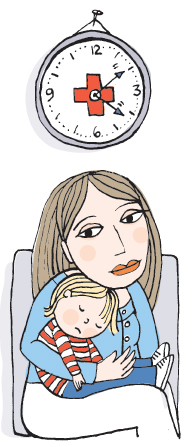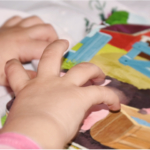
20 Feb The ER at Midnight: Fear, Hope, and the Hours That Drag On
After enduring the uncertainties of how to respond to her son’s illness, it is another family’s plight that provides a lasting lesson to Cathy Watson.
It’s a strange, twilight zone, the Emergency Department at night. It is full of interrupted lives and children in dressing gowns, moaning, sneezing, crying; and furrowed-faced mothers and fathers. I could spot the first-time parents. Both of them were there, gazing anxiously at their child. Their only child. Sometimes there were grandparents or friends to give moral support, hovering with encouraging, hopeful words of comfort or distraction. Others, like me, had come alone. Perhaps some had a husband and other children at home asleep. Some of us had been here before. I had come equipped for a long wait: some snacks, a book, drinks, sudoku… A child zoomed around noisily on a plastic bike. Her mother was rocking a pram that was emitting grunting noises.
The clock moved laboriously, ticking off the minutes, hours.
The last few days of worrying and reassuring had led us to this place where there was nothing to do but wait. All children get sick. My son’s fever had hung around for a bit. The febrile convulsion took me by surprise, but I knew what it was and what to do. He made a quick recovery, then two hours later started vomiting. But he wasn’t dehydrated. He managed to drink. His tongue was moist. He still went to the toilet. It was probably a virus. Surely he would be all right.
Grandparents were called in to collect our other children from school. Concerned friends phoned. “He’s doing fine,” I told them. It’s only a virus. I’m sure he’s getting better…” I cancelled work for the following day.
When Symptoms Blur the Line Between Caution and Panic
My small son grew more listless; the vomiting became more frequent. I needed to take him to the doctor to make sure it wasn’t something serious. Suppose it was meningitis? “Is your neck sore?” My son nodded. All the pieces were falling into place. Fever, vomiting, neck stiffness, wanting the blinds down… A quick body scan revealed no rash. But then the rash was a late sign, wasn’t it? Where was that pamphlet that had been stuck on the refrigerator?
He pointed to his throat. He opened his mouth. “Down der,” he explained. Sore throat. Maybe it was because he hadn’t been drinking much and his throat was dry. And then, just as I was thinking about taking him to the hospital, he fell asleep. Perhaps he would wake up better. Perhaps taking him out now would delay his recovery. But what if he was in a coma? How could you tell? Paralysis of indecision.
 He woke in the evening, the other children creating diversions, his father questioning.
He woke in the evening, the other children creating diversions, his father questioning.
Our doctor’s mobile was unattended. The telephone call to the nurse in the Emergency Department gave no joy: no telephone information; come in if you’re worried; up to a three-hour wait. Hardly a warm invitation. I phoned the 24-hour nurse-on-call service. Maybe the maternal and child health after-hours number? There was no advice as to how long the wait would be, so I waited, and waited: “Please hold the line. Your call is important to us.” When I eventually spoke with them, there were still no clear answers: it’s up to you; you can make the right decision.
 The Endless Wait Begins
The Endless Wait Begins
We decided to take him to the hospital. But he was asleep again. Perhaps the worst of it was over. We dug out the baby monitor and indulged in some sleep ourselves while waiting for the cry. ‘Coffee ground’ vomit – that prompted us into action.
This was the train of events that led us here, to this thinly disguised hospital. Brightly coloured walls, pictures of balloons and even a play area in the corner for the siblings of the sick. It was the lino floors, the antiseptic and the anxiety that gave the place away. As we waited, more children came in. One sported an open cut across his forehead, and a grazed nose. The baby in the corner would not stop crying. Was she looking sicker than my small son whose pyjamas now hung off his hips? That baby was going to bump him out of his place in the queue. The nurse at the desk continued her dialogue: “What happened then? OK. Just give some details to the clerk there. It shouldn’t be too long a wait.”
‘Liar!’ I felt like calling. ‘Don’t listen to her! We’ve been here for more than two hours. How long is not long?’
But then it occurred to me that this could well be a good sign. Having a long wait must be because they considered my little boy to be not very sick. There must be others whose illnesses were far more serious. That had to be a good thing. Not for them, mind you. But I could wait. And how many opportunities did I have to sit with my son’s silky head on my lap and rediscover the fine hairs along his temple?
Perspective in the Chaos
The security guard near the entrance looked up as a man at the desk raised his voice. Then another women made it to the front of the queue at triage. Her son didn’t look very sick. Surely there was no reason for him to come in. Surely he could have waited until the morning. She pulled out an information folder about children and cancer. “This tells me that I should be concerned if I can’t keep his temperature below 40 degrees,” she explains. “Well I tried. I just haven’t been able to keep it down for the last three days and thought I’d better bring him in.”
I was eventually informed that my son probably had a virus. It’s just that it went on for a very long time and was a particularly rugged strain. He was going to get better. I did the right thing – I needed to hear that. We discussed the options of care and I decided on the least-invasive route. So eventually we escaped into the sharpness and solitude of the night air. The events of the preceding hours and days had left me drained. But the good thing was that my son and I were returning home, driving sleepily along the deserted freeway.
The wait really was a small price to pay. When my children next get ill, or some inconvenience interrupts our chaos, I’ll think of that tired, defeated-looking woman, standing patiently with her apparently healthy son, clutching a folder. The inconvenience of the wait had at least had a positive outcome for us. We were able to take our son home.
Illustrations by Katherine Chadwick




